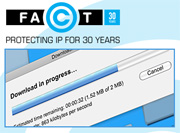Registrar Suspends Torrent Domain For DMCA Non-Compliance
samedi 14 juin 2014 à 10:21 The seizing or suspension of file-sharing domains is a big issue at the moment. It’s a strategy being employed by the Police Intellectual Property Crime Unit in the UK (with varying results) after being trialled on thousands of domains in the United States.
The seizing or suspension of file-sharing domains is a big issue at the moment. It’s a strategy being employed by the Police Intellectual Property Crime Unit in the UK (with varying results) after being trialled on thousands of domains in the United States.
Today we take a look at an interesting case that developed this week involving a movie anti-piracy company, a domain registrar and a torrent site.
Bittorrent.pm is a torrent index that doesn’t host any torrents itself but links to those to be found elsewhere. The site registered its domain with well-known registrar Internet.bs last year. The third player in the mix is a company called Rico Management, apparently acting in an anti-piracy capacity for the movie Cold in July.
During the past few days it became clear that Rico Management were trying to have some torrents removed from Bittorrent.pm. However, Bittorrent.pm only became aware of the complaint after being contacted by its registrar, Internet.bs. Since Bittorrent.pm hadn’t provided a formal tool or contact mechanism for facilitating removals, Rico complained directly to the registrar.
In emails seen by TorrentFreak, Internet BS responded to Rico assuring them that action of some type would definitely be taken.
“I added our customers in BCC of this email and they will get back to you shortly regarding this. If you do not get any answers within 48 hour please get back to us and we will investigate and suspend the domains,” the registrar told Rico.
When the operator of Bittorrent.pm questioned the potential suspension of his domain, Internet BS told him he needed to take action, since the registrar did not want to become liable for any infringements.
“We did not say we will suspend the domain but we will suspend it if you do not reply to the complainant,” Bittorrent.pm’s owner was told. “The difference is in the fact that, by answering to the complainant, you assume responsibility for the content on your website and we can also understand better what you are doing.”
“If you do not answer to the complainant we can be found liable for being informed
about illegal things and not taking any action. If we do not see any answer we have no choice but to assume the complaint is legitimate and then we have to suspend the domain.”
In the meantime, Bittorrent.pm protested that he had no torrents on his site to be removed, a comment that solicited the following response from a Jeffrey Moreira at Rico Management.
“You do not have any clear contact on your page to deal with any issues that a copyright holder has with you. I have had to jump through hoops to finally get a response directly from you about bittorent.pm,” Moreira wrote.
“You have multiple torrent files available for torrent download on your site.
You may simply claim that you do not have copyrighted material on your site but that is far from the truth.”
Eventually Internet.bs carried through with its threat to suspend the domain. It also received more complaints about Bittorrent.pm, something which further tested relations.
“As the complainant said you have absolutely no contact details on your website. We received about 15 new complaints regarding your website today. You need to have some contact details as we cannot act as your abuse department especially with the very low margin that we have on domain names,” the registrar wrote.
The operator of Internet BS argued back that there is nothing in his domain terms and conditions that obligates him to have such an abuse mechanism, but apparently that didn’t have the desired effect. His domain remains suspended and he’s currently working to transfer it to a new registrar.
The approach taken by Internet BS in response to the Bittorent.pm issue raises a number of questions, including whether a registrar should get involved in this kind of dispute and whether they are in the best position to play judge and jury. Obviously Internet BS wants to abide by the DMCA in this case, but as Bittorrent.pm points out, as a Barbados-based company it doesn’t necessarily have to. Bittorrent.pm is not based in the US either, although Rico Management appears to be.
Also, while it could be argued that Bittorrent.pm should have a contact form, it’s ironic that RicoManagement.com has no outward web presence at all to help show who they are or indicate that what they are doing is legitimate. At the moment all they have is a GoDaddy holding page, and Internet BS were apparently happy to act on that.
TorrentFreak requested comment from both Internet BS and Rico Management but we are yet to receive a response.
Source: TorrentFreak, for the latest info on copyright, file-sharing and anonymous VPN services.


 After coming under intense criticism, this year Italy was removed from the Watch List in the USTR’s Special 301 Report. Part of the formula for that achievement was to be found in telecoms regulator AGCOM.
After coming under intense criticism, this year Italy was removed from the Watch List in the USTR’s Special 301 Report. Part of the formula for that achievement was to be found in telecoms regulator AGCOM.
